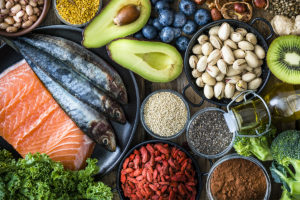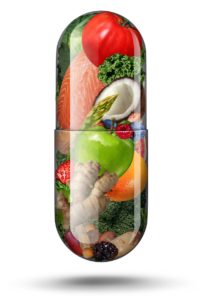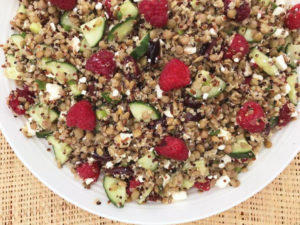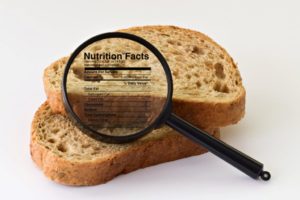Supplements/Ergogenic Aids
Sports Supplements Changing Athlete Attitudes
Depending on the sport and level of competition, 40%–100% of athletes use sports supplements, such as creatine and certain stimulants.
Mega Heart-Healthy Fat
Heart disease remains the leading cause of death in America, but omega-3 fatty acids can help, according to a review on cardiovascular disease prevention.
Vote Citrus for More Muscle
A study published in The Journal of Nutrition found that adults with the highest levels of vitamin C had more skeletal muscle growth.
A Feel-Good Pill to Swallow
It’s possible that the benefits of multivitamins can be chalked up to the placebo effect, according to a study in BMJ Open.
The New Protein Math
If you’re working with clients who are pumping iron to build muscle, be sure they have plenty of protein on their plates.
Is There a D-fence Against COVID-19?
More science is needed, but being deficient in vitamin D may make someone more likely to experience serious health complications if infected with COVID-19.
Magnificent Magnesium
How much do you think about magnesium?
Chances are, you and your clients don’t give this marvelous mineral the credit it deserves. Name the bodily function, and chances are pretty good that magnesium is somehow involved. It plays a role in a diverse group of over 300 biochemical reactions in the body, including a number of them specific to physical activity: protein synthesis, muscle and nerve function, energy production, oxygen uptake and electrolyte balance. It’s also involved in blood glucose control, blood pressure regulation, structural bone development, normal heart rhythm and more (ODS 2019).
Caffeine—An Equal Opportunity Ergogenic Aid
Caffeine is known to increase performance when taken before endurance activities, but more than 80% of studies have focused on men. A recent randomized, double-blind, crossover study out of Queensland, Australia, aimed to determine whether or not gender affects ergogenic responses to caffeine.
Higher Vitamin D Levels Linked To Better Fitness
There’s another reason to make sure you’re getting enough of the sunshine vitamin: High levels of vitamin D in the blood are now linked with better fitness, according to research from the Virginia Commonwealth University School of Medicine.
Higher Vitamin D Levels Linked To Better Fitness
There’s another reason to make sure you’re getting enough of the sunshine vitamin: High levels of vitamin D in the blood are now linked with better fitness, according to research from the Virginia Commonwealth University School of Medicine. In the study, published in the European Journal of Preventive Cardiology, 20- to 49-year-olds with better vitamin D status also tended to have greater cardiorespiratory fitness, a measure of aerobic fitness often determined by measuring maximal oxygen consumption (VO2max) during exertion.
Something’s Fishy With Fish Oil
Don’t like fish? Well, you might not be able to turn to the supplement aisle to get the same benefits for your heart. A Cochrane report exploring 79 randomized trials of more than 112,000 adults (both with and without heart disease) showed that increasing omega-3 intake, mainly from fish oil pills taken for at least 1 year, did not significantly prevent heart attacks, strokes or deaths in general.
Food, Not Pills
Count this as more proof that we shouldn’t rely on pills and powders to make up for dietary shortfalls.
Belly Fat vs. Vitamin D
Here’s another good reason for people to reduce their Buddha-bellies: improving their vitamin D status. According to data presented at the 2018 European Society of Endocrinology’s annual meeting in Barcelona, Spain, researchers from the Netherlands found that more body fat around adults’ waistline is associated with lower vitamin D levels. Beyond raising the risk of weak bones, poor vitamin D status could set the stage for other health issues, including heart disease and compromised immunity.
Phytoestrogens and the Safety of Soy
Are phytoestrogens safe? The growing popularity of soy products in U.S. and European diets has raised considerable controversy.
Recipe For Health: Raspberry Quinoa Lentil Salad
For years, we’ve heard that eating more dietary fiber delivers a range of health
benefits, from greater weight loss to better blood sugar control to lower cholesterol
levels. Now, scientists increasingly suggest that much of the power of fiber
is due to its impact on the human microbiome—our internal colonies of bacteria.
Eating a wide range of high-fiber foods appears to nourish the microbiome
in our digestive tracts.
Who Is (and Isn’t!) Reading Food Labels
The Nutrition Facts panel displayed on all packaged food can relay critical nutrition information like calorie, sugar and fiber content—but only to those who read the label.
An investigation by the University of Minnesota’s School of Public Health and Medical School found that a mere one-third of adults aged 25–36 report frequent use of the Nutrition Facts label. Women, people with more education and income, those who cook more of their own food, and people who exercise regularly were more likely to examine their food purchases carefully.
Question of the Month
Do you or your clients drink energy beverages to get a lift? Do you think government agencies should better regulate these drinks? What do you consider the major health concerns of heavy consumption? Or do you believe the reported dangers are overblown? Send your responses to Sandy Todd Webster at [email protected].
Caffeine Boosts Performance in Athletes Who Use It Rarely
Caffeine stimulates the central nervous system, allowing athletes of all stripes to complete longer, harder workouts. But new research suggests that people who usually avoid coffee and energy drinks likely benefit the most from caffeine.
Magnesium Boosts Power of Vitamin D
Your clients may believe they’re getting ample vitamin D, but they won’t get the full benefit if their diet lacks magnesium. A study published in the Journal of the American Osteopathic Association found that vitamin D is not properly metabolized when magnesium levels are low. Thus, it remains largely inactive in the body, leaving people vulnerable to disorders related to poor vitamin D status, including weak bones.
Go Fish for Stronger Bones
A trip to the fishmonger can help your bones and your heart. Scientists have long noted a link between eating omega-3 fats in certain fish and improving heart function, but these mega-healthy fats are not a one-hit wonder. Critical Reviews in Food Science and Nutrition published a meta-analysis of previous research (which included 292,657 people)—and reported an inverse relationship between fish consumption and risk of hip fracture. Mechanisms still need to be sussed out, but in the meantime it’s a good idea to work fish into our diets at least twice per week.


















